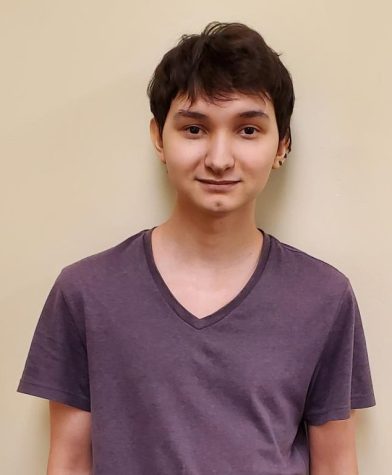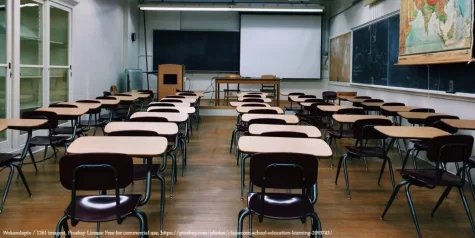The School System and Neurodivergency Awareness
How the School System Works for Students with ADHD and Autism.
October 25, 2022
Throughout recent history, neurodivergency has experienced an increase in acceptance. Accommodations for those with ADHD and Autism have become prominent recently, and one place that these accommodations are said to be uncommon are in the school system. Many differing views on Neurodivergent students’ struggles faced in modern times exist, looking at various sources who have personal experience as neurodivergent people themselves is important when it comes to understanding the situation fully.
with ADHD and Autism have become prominent recently, and one place that these accommodations are said to be uncommon are in the school system. Many differing views on Neurodivergent students’ struggles faced in modern times exist, looking at various sources who have personal experience as neurodivergent people themselves is important when it comes to understanding the situation fully.
Despite what some think, neurodivergence is a very common occurrence. According to the CDC, 15-20% of people have some form of known neurodivergence (not including people who have unidentified Autism and ADHD). For reference, the National Library of Medicine estimates that 1-1.5% of the population has a peanut or tree nut allergy, the AAAAI states that an estimated 10-30% people have any allergies at all. This information shows the extent to which this affects the general population, and shows reason for systems to account for neurodivergence.
“The school system isn’t set up for neurodiversity,” Says Steve Hamilton, neurodivergent history teacher here at Capital, “it’s set up in a way that suits some students over others. We can talk about Capital or the school district all we want, but I don’t think the school system as a whole has done much to address neurodiversity at a big level.” Generally, neurodivergent people’s consensus is that the school system isn’t set up for their success, while working for some neurodivergent students, neurotypicals are who the school system was made for, whether intentional or not. Despite how much of the population has even just diagnosed neurodivergency, and despite the strides taken in modern times, most agree that the school system, at its core, still continues to neglect neurodivergent students and their needs.
This problem isn’t strictly a problem with OSD, it isn’t even strictly an American issue either. “It all honestly depends on the school,” states Niko Kylmälä, a neurodivergent student from Finland who also has anxiety and tourettes “schools here have counselors who are supposed to assist neurodivergent students if needed, but they’re usually not that good at their jobs.” Kylmälä was also sure to clarify that Finnish schools have a specialized plan for neurodivergent students, very similar to a 504 plan here in America. He also made sure to add that he personally struggled getting one for what would be considered middle school in America “After a while of trying, I ended up getting one. I’m allowed to leave class or school if I’m overwhelmed, plus, teachers usually don’t get mad at me for wearing headphones and don’t mind my tics.”
Many say that what schools don’t help all neurodivercities with has a negative effect on not just grades, but mental health of neurodivergent students as well. ”I think it definitely has a negative effect on people.” responded McKenna Coat, a neurodivergent student here at Capital. “You could be trying your very best, but if you learn a different way, especially a way a teacher doesn’t like, they aren’t going to accommodate you. While some teachers are really cool about that, it depends on the teacher, not all are going to accommodate all neurotypes. I think all that can make it really hard for neurodivergent people when they do get worse grades, and can get them to think ‘oh, I’m less smart or not as good’ due to them not reaching the neurotypical standards.”
Beyond how schools teach students, many issues can come down to the environment of the school itself. “The classroom can make many students struggle with over stimulation,” Coate continued, “making the classroom not able to let them work their best. If it’s too loud, or if you learn more visually and have trouble with long readings, that’s definitely going to cause you issues in the class”
Through this problem’s true scope, it can feel as though the only option is waiting for change, waiting for someone with enough power to care enough and make things right, but there’s still ways anyone can help, both small and big. Teachers and students alike can make a world of difference, even if in just one person. When discussing more ways people can help neurodivergent people, Kylmälä shared a story of one such person. “Whenever I would feel anxious at school, I would go to my school nurse’s office. The Nurse would let me sit on this bed that’s in the waiting room but separate it with a curtain so it would still be a private area. She would always check on me from time to time to ask how I’m doing, but she never pressured me to talk when I was nonverbal. If I couldn’t handle going back to class she would either ask my mom or dad to pick me up. Her being there helped me through so many hard days during 9th grade. I really appreciate her. We need more people like her I think.”
Despite this, there’s still things believed to help on a smaller level for all neurotypes of students. McKenna voiced her appreciation for accommodations given on a teacher to teacher basis that help many out. “One example is when you have to give a presentation, and the teacher offers alternatives like presenting to a small group, or presenting to only the teacher. Little things like that really help out.”
So, after all this, one may ask, ‘how can this even be fixed?’. Though there is no simple answer. Throughout each interview, one main overarching theme was the need for education on neurodiversity for students and teachers alike as a requirement. “I think our first step is getting all the staff in Capital to understand neurodiversity at a higher level.” Mr. Hamilton continued. “I don’t think there really is any small step we can take as it is. We all need to understand neurodiversity a lot better as an organization before any real strides can be taken before any of us can fully address that. Understanding human brain research and all of us, neurodivergent or not, need to be updated in schools.”








